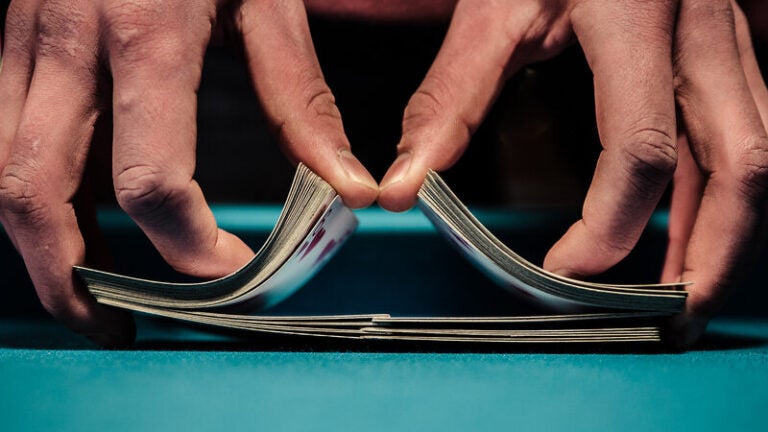
In upcoming book, expert reveals the fascinating link between math and card shuffling
Mathematics sometimes impacts our lives in seemingly unsuspecting ways, including card shuffling.
Math can answer the age-old question of how many times a deck of cards needs to be shuffled to ensure the cards are thoroughly mixed. It can even reveal the best method for dealing cards.
Jason Fulman, professor of mathematics at the USC Dornsife College of Letters, Arts and Sciences, studies card shuffling using math. He shares what is known on the topic in an upcoming book, The Mathematics of Shuffling Cards (American Mathematical Society), which he co-wrote with acclaimed mathematician Persi Diaconis. The book is due out in June.
Card shuffling is a numbers game
Among the many insights Fulman provides is that the number of shuffles required to thoroughly mix a deck of 52 cards depends on the shuffle type used.
The riffle shuffle — splitting the deck roughly in half then using the thumbs to quickly interleave the cards — is the most efficient. It requires just seven shuffles to mix a deck well.
Scattering the cards out flat on the table and randomly spreading them over each other, called “smooshing,” requires 30 to 60 seconds for thorough mixing.
The overhand method — taking sections of a stacked deck and moving them over to make a new stack — must be repeated a whopping 10,000 times to mix the cards well.
What the cards are being used for makes a difference, too. In blackjack, for example, card suits don’t matter, and certain cards are equivalent, so just four or five riffle shuffles are plenty for mixing.
Then there’s magic. Perfect shuffles can restore a deck to its original order, and specific sequences of shuffles can move a card to a desired position, enabling a magician to control the cards in a way that seems magical.
For mathematicians, fairness is a big deal
Fulman also explores card dealing, a key to ensuring fairness in card games.
Two commonly used methods of card dealing are the cyclic method and back-and-forth. In the cyclic method, cards are dealt in a repeating sequence such as one, two, three, four, one, two, three, four. Back-and-forth uses alternating directions such as one, two, three, four followed by four, three, two, one.
Back and forth dealing is faster and improves the cards’ randomness, thus requiring fewer shuffles for a well-mixed deck.
Card shuffling is not just fun and games
Card shuffling has practical applications beyond card games, magic tricks and gambling.
Analyzing the mixing time of shuffling helps computer scientists determine the optimal distribution of files and folders in databases. And biologists have considered the mixing time of shuffles to study the order of genes, which can help them estimate the evolutionary distance between two organisms, Fulman says.
Studying “patience sorting,” dealing cards into piles, sheds light on passenger airline boarding, and researchers study card shuffling in hopes of understanding and improving traffic flow.
But mathematicians still puzzle over many questions about card shuffling, Fulman says.
For instance, they want to know the number of shuffles required to thoroughly mix a deck using the almost perfect shuffle technique employed by Las Vegas casino dealers, who perform “neater” riffle shuffles achieving near-perfect alternation from one hand to the other.
They also remain stumped by the optimal guessing strategy to maximize the expected number of correct guesses when turning up cards one at a time after a series of riffle shuffles. An answer to this question is also of interest to gamblers, who want to be able to guess as many correct cards as possible, and to casino executives, who want gamblers to be able to guess as few correct cards as possible.
But given enough time, the odds are that mathematicians like Fulman will sort out these and many other card-shuffling conundrums.